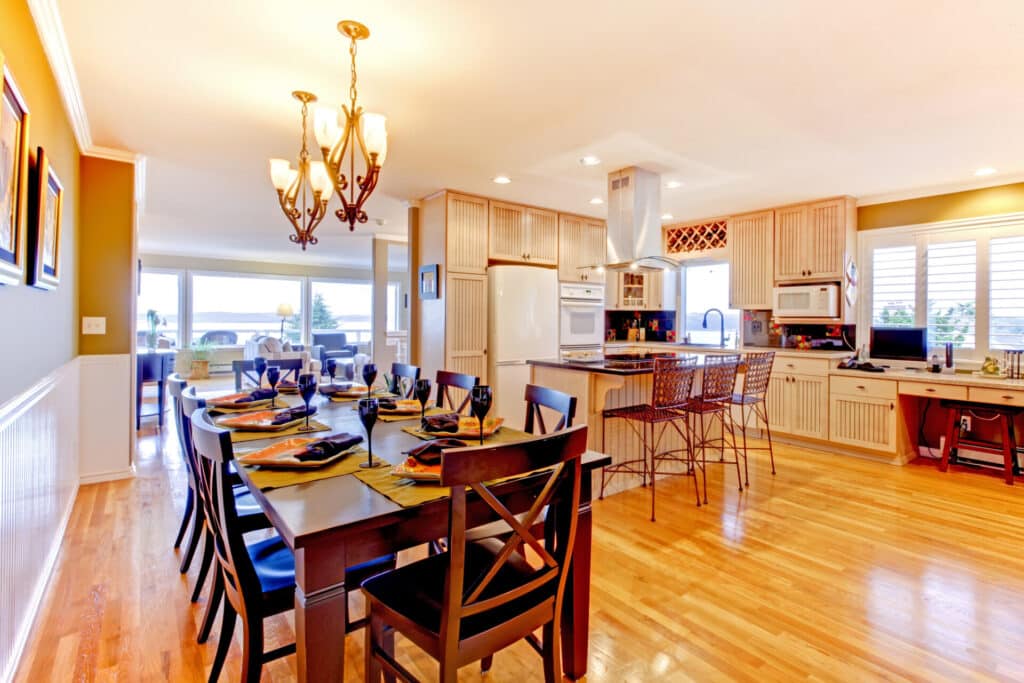
When it comes to choosing the right flooring option for your kitchen, there are plenty of choices available. From tiles and linoleum to laminate and hardwood, each option has its own set of pros and cons. One highly popular choice that has been gaining traction in recent years is hardwood flooring.
Hardwood flooring is known for its timeless and elegant appeal. It can instantly elevate the overall aesthetic of any space, including your kitchen. However, before making a decision, it’s important to weigh the pros and cons of opting for hardwood flooring in your kitchen. In this article, we will explore both sides to help you make an informed decision.
Pros of Hardwood Flooring in Kitchens
1. Timeless Beauty:
Hardwood flooring offers a classic, timeless look that never goes out of style. It adds warmth and character to any space, including the kitchen. Whether you have a traditional or modern kitchen, hardwood flooring complements both styles effortlessly. Its natural grains, varied colors, and finishes make it highly visually appealing.
2. Durability:
Hardwood flooring is known for its durability. If properly maintained, it can last up to for more than a decade. Some hardwood flooring options have been known to last for over a century. Hardwood is resistant to dents, scratches, and stains, making it an ideal choice for a high-traffic area like the kitchen. With proper care and maintenance, it can withstand heavy foot traffic and the occasional spills that are common in the kitchen.
3. Easy to Clean:
Another advantage of hardwood flooring in the kitchen is the ease of cleaning. Hardwood does not trap dirt, dust, or allergens like carpet or laminate flooring. Everyday sweeping and occasional mopping are usually all that is needed to keep it clean. It is also resistant to spills and stains, making it easier to wipe away any accidents. This can be particularly advantageous in a space notorious for spills and food crumbs.
4. Health Benefits:
Hardwood flooring is a healthy choice for your kitchen as it does not harbor allergens or bacteria. Unlike carpet, which can trap dust mites and other allergens, hardwood flooring provides a cleaner and healthier environment. This is especially important for those with respiratory conditions or allergies.
5. Increased Property Value:
Opting for hardwood flooring in the kitchen can increase the value of your property. Potential buyers often prefer the classic and luxurious look of hardwood. It can be a significant selling point and may lead to a higher resale value in the future.
Cons of Hardwood Flooring in Kitchens
1. Cost:
One of the biggest drawbacks of hardwood flooring is its cost. It tends to be more expensive compared to other flooring options like laminate or vinyl. The price of hardwood can vary depending on the type of wood, finish, and installation method. However, it’s important to consider it as an investment that can add value to your home.
2. Vulnerable to Moisture:
Hardwood flooring is susceptible to moisture damage. While advancements have been made in protective coatings, it is still important to prevent excess moisture in the kitchen. Spills and leaks should be cleaned up right away to prevent water from seeping into the wood and causing damage. This vulnerability to moisture can limit the types of hardwood flooring that are suitable for kitchens.
3. Susceptible to Scratches:
Hardwood flooring is not immune to scratches despite its durability. Over time, heavy foot traffic, furniture, and pets can leave marks on the surface. However, scratches can be easily repaired through sanding and refinishing, which can restore the natural beauty of the wood.
4. Susceptible to UV Damage:
Direct exposure to sunlight can cause the color of hardwood to fade over time. This is a consideration for kitchens with large windows or skylights. To prevent or minimize fading, it is recommended to use blinds or curtains to shield the floor from direct sunlight.
Maintenance:
While hardwood flooring is relatively simple to clean, it does require repetitive maintenance to keep it looking its best. This includes regular dusting, sweeping, and occasional mopping with hardwood-specific cleaners. Additionally, hardwood floors may require sanding and refinishing every few years, depending on wear and tear.
Tips for Choosing Hardwood Flooring for the Kitchen
If you decide to opt for hardwood flooring in your kitchen, here are a few tips to help you make the best choice:
1. Consider the type of wood:
Choose a hardwood species that is known for its durability and resistance to moisture and scratches. Hardwoods like oak, hickory, and maple are popular choices when doing kitchen remodeling in Santa Rosa.
2. Select the right finish:
Opt for a finish that provides extra protection against moisture and stains. Some finishes, such as polyurethane or aluminum oxide, provide excellent durability and can prolong the lifespan of your hardwood flooring.
3. Consider engineered hardwood:
Engineered hardwood is a popular alternative to solid hardwood for kitchens. It consists of a thin layer of real wood on top of plywood or high-density fiberboard (HDF). Engineered hardwood is resistant to moisture than solid hardwood and can be a more cost-effective option.
4. Consult with a professional installer:
It’s essential to seek consult with a professional installer who can provide guidance on the best hardwood options for your kitchen. They can assess factors such as moisture levels and subfloor conditions to ensure proper installation.
In conclusion, hardwood flooring in kitchens offers a timeless and elegant look with several advantages. It can boost the overall aesthetic of your kitchen, provide durability easy maintenance, and even increase the value of your property. However, it is important to consider the cost, vulnerability to moisture, and susceptibility to scratches before making a decision. By carefully weighing the pros and cons and following the tips provided, you can make an informed choice that best suits your needs and preferences.
